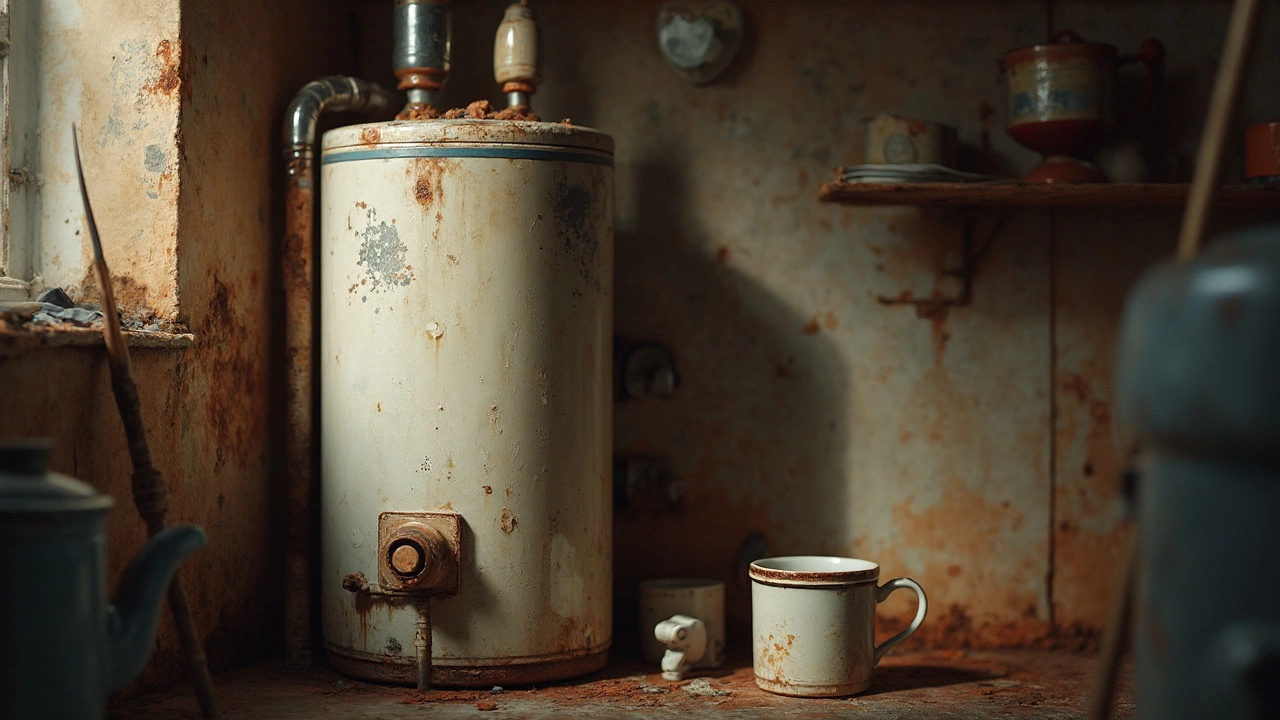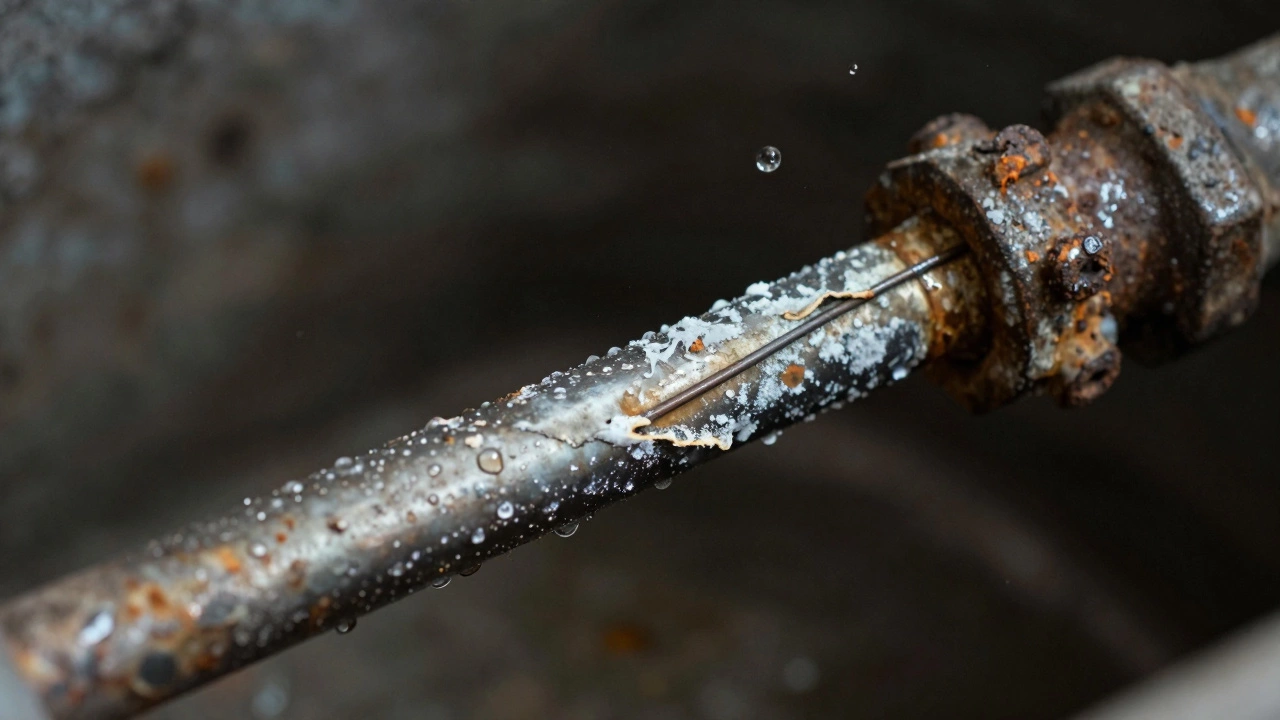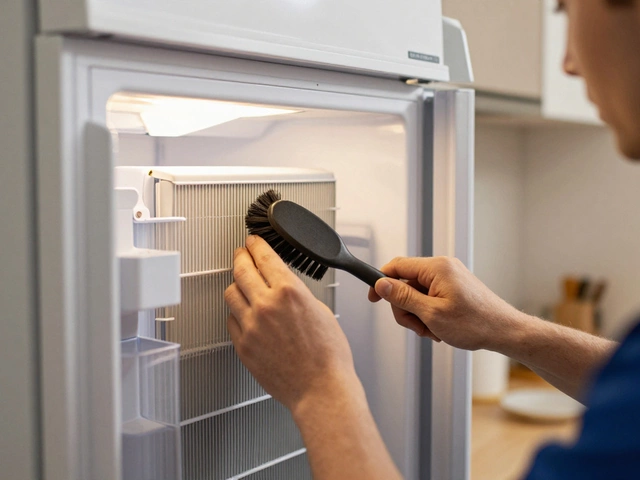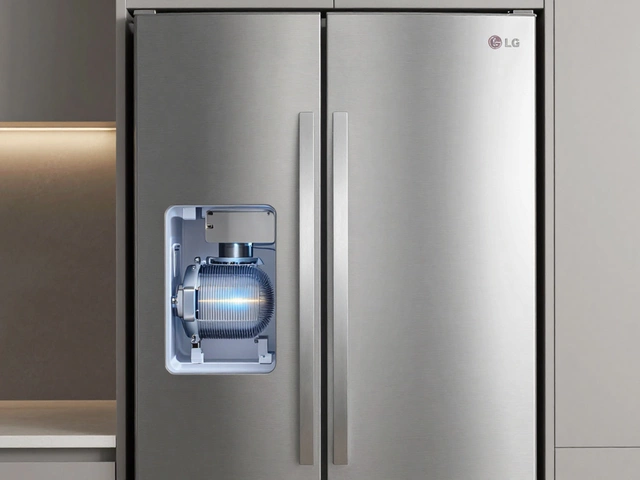Ever hear a clunk from your water heater and wonder if it’s about to quit? You’re not alone. Most folks don’t think about their water heater until a cold shower shocks them awake. The truth is, water heaters don’t last forever, and most people are surprised by how variable their lifespans can be.
If you’re trying to figure out when yours might need replacing—or how to stop rust and leaks in their tracks—you’re asking the right questions. The average water heater hangs in there for 8 to 12 years. Some call it quits early, while a lucky few keep heating water for 15 years or more. Why the gap? It comes down to what’s happening inside your tank, what kind of maintenance it gets, and even the minerals flowing with your water.
Don’t fall for the old lie that “if it ain’t broke, don’t fix it.” Ignoring small hints—like rumbling noises, weird smells, or a little rust around the base—can leave you with a big mess and a hefty emergency bill. Understanding what helps or hurts your heater’s lifespan saves you money, time, and stress.
- What Impacts a Water Heater’s Lifespan?
- Electric vs. Gas: Does Type Matter?
- Warning Signs Your Heater’s Fading
- Tips to Make Your Water Heater Last Longer
What Impacts a Water Heater’s Lifespan?
If you want your water heater to last, you’ve got to pay attention to a few key things. The big one? Water quality. Hard water, loaded with minerals like calcium and magnesium, will eat away at the inside of your tank faster than you’d think. These minerals settle at the bottom and create a gritty sludge, making your heater work harder and burn out sooner.
How often you flush your tank matters a lot. Most people skip annual flushing, but draining a few gallons every year knocks out that buildup and actually adds years to your heater’s life. Installation mistakes can also be a silent killer. If the unit wasn’t set up right, or it’s in a cramped spot where it can’t breathe, it’s more likely to fail early.
- Water heater age: Most don’t make it past 12 years, even with solid care.
- Usage: The more hot showers, laundry, and dishes, the faster the wear and tear.
- Maintenance habits: Ignore the yearly checkup, and repairs sneak up faster than you’d like.
- Water pressure: Too much pressure is rough on your tank and can cause leaks.
- Anode rod condition: This part stops rust inside the tank. If it’s gone, rust wins.
"The number one reason water heaters fail early is a lack of basic maintenance. Most homeowners are shocked by how much simple things like flushing the tank or checking the anode rod can extend the life of their unit." — American Society of Home Inspectors
Don’t forget, different climates matter too. Humid basements or garages can encourage corrosion around the base. If your tank’s in a tight, damp space, you’ll want to keep an eye out for rust or leaks.
| Factor | Effect on Lifespan |
|---|---|
| Hard Water | Reduces it by up to 2-3 years |
| Poor Maintenance | Cuts lifespan in half |
| High Usage | Shortens by 1-2 years |
| Annual Flushing | Adds 2+ years |
Paying attention to these details isn’t overkill—it’ll save you from a shockingly icy morning or a flooded basement.
Electric vs. Gas: Does Type Matter?
Trying to figure out if an electric or gas water heater lasts longer? It actually makes a real difference. Many people guess the two types are pretty much the same, but that's not how it works out over time.
If you’re comparing raw numbers, electric water heaters usually outlast gas models by a couple of years. You’re looking at about 10–15 years for electric, while gas heaters tap out closer to 8–12 years. Why? Electric heaters have fewer parts that wear out, and they don’t deal with open flames, so there’s less stress on the tank and heating elements. On the flip side, gas heaters work faster and heat up water quicker, but all that hustle means more wear and tear.
Here’s a quick look at how the two compare side by side:
| Type | Average Life Span (Years) | Common Issues | Notes |
|---|---|---|---|
| Electric | 10–15 | Heating element burnout, thermostat failure | Fewer parts break; slightly slower heating |
| Gas | 8–12 | Pilot light, thermocouple, venting problems | Heats fast; more moving parts at risk |
It’s not just about numbers. Gas heaters require a vent, so there’s more chance for drafts or backdrafting problems, especially if your house is older. They also need regular checks on the pilot light and gas line. Electric units are much simpler—you plug them in, check the thermostat, and usually call it a day.
- If energy costs matter, gas usually costs less per month but may cost more in repairs down the road.
- If you want less hassle, electric models tend to be plug-and-play.
- If you have a big household that showers at the same time every day, a gas heater might keep up better.
One more thing: if you’re looking at water heater replacement, always factor in what you already have at home. Swapping an electric for gas (or the other way around) isn’t just a matter of bringing home a new tank; you might need new wiring, a vent, or a gas hookup, which runs up the bill fast.
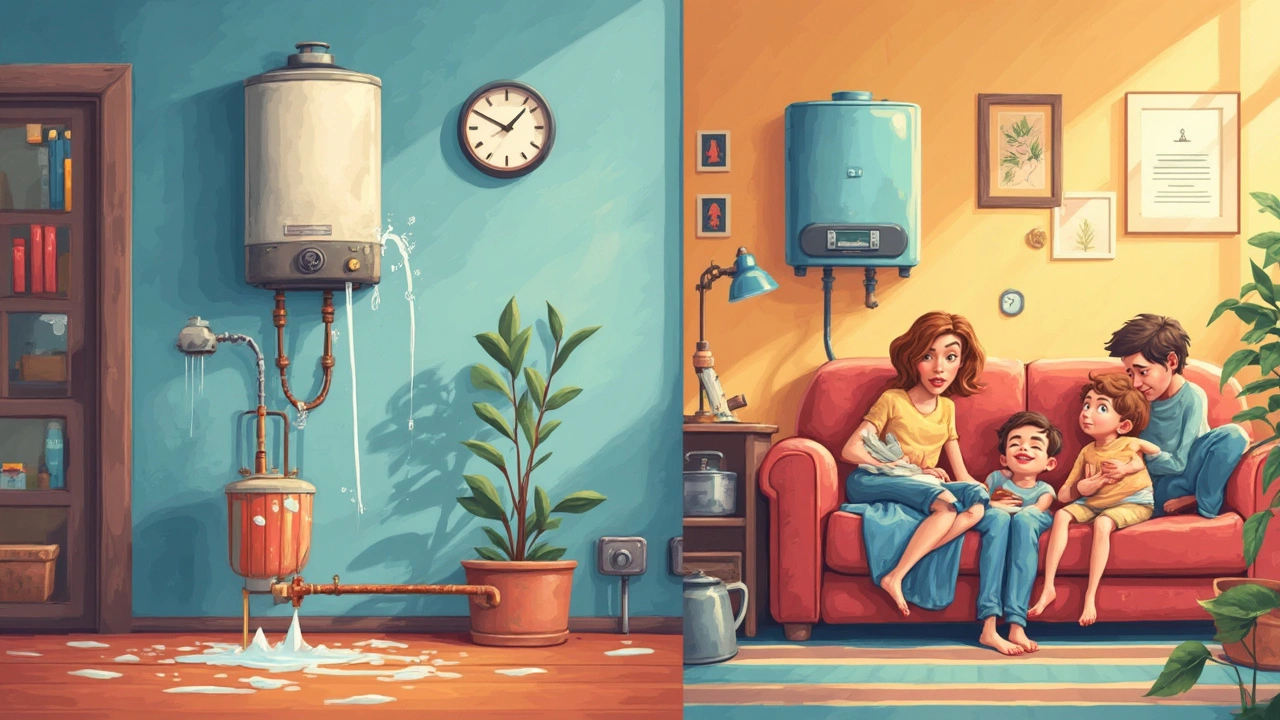
Warning Signs Your Heater’s Fading
Most people don’t think twice about their water heater until the hot water disappears. But with a little attention, you can spot the warning signs before your heater gives out. Paying attention can save you from a flood, a freezing shower, or a big repair bill.
Here’s what usually tips you off that your water heater’s on its last leg:
- Water isn’t hot enough: When you keep cranking the knob but the water never gets as hot as it used to, that’s often a red flag. This could mean your heating element’s failing, or sediment is building up at the bottom of the tank.
- Strange noises: Knocking, popping, even rumbling—these sounds usually mean sediment is hardening and rattling around the tank. Left alone, it puts extra stress on the tank and shortens its life.
- Rusty or cloudy water: If water from the hot tap looks orange, rusty, or just cloudy, your tank could be corroding from the inside. Rusty water is a sign the inside lining is thinning and leaks aren’t far away.
- Leaking around the base: Water around the tank’s base? That’s usually a crack or corrosion problem. Even small pools can turn into bigger leaks quickly.
- Tank age: If yours is pushing 10 years or more, things start going downhill fast. Most experts will tell you to think about replacing at the 8-12 year mark, even if nothing seems obviously wrong.
Just so you can spot the danger zone, here’s a quick look at what’s normal for different ages:
| Heater Age | Common Issues |
|---|---|
| 0-5 years | Unlikely to have major problems; keep up with basic maintenance. |
| 6-10 years | Possible heating element wear, more frequent minor repairs, start to watch for rust. |
| 11-15 years | Corrosion, leaks, major loss of efficiency; replacement likely needed. |
The number one thing to remember: if you spot one of these warnings and your heater’s older, don’t wait. It’s cheaper to plan a replacement than deal with a soaked floor or calling an emergency plumber at 2 AM. Stay sharp for those signals, and your next water heater won’t catch you off guard.
Tips to Make Your Water Heater Last Longer
This stuff isn’t rocket science—you really can squeeze a few extra years out of your water heater just by giving it some regular attention. A couple of hours a year can make the difference between a heater that fizzles at eight and one that keeps going strong at fifteen.
- Flush the Tank Yearly: Sediment builds up at the bottom, cooking on the heating element and making your heater use more energy. Once a year, drain a few gallons out of the tank. Your owner’s manual spells out how, but usually it’s easy—a garden hose and a bucket will do.
- Check the Anode Rod: This is a metal rod inside the tank. Its whole job is to rust instead of your tank. After 3-5 years, it’s often eaten away. Pop the top, check it out, and swap it for a new one if it looks skinny or crusty.
- Keep the Temperature Reasonable: Set your thermostat to 120°F. Going higher just wears things out faster. Plus, it saves on your bills and avoids scalding.
- Watch for Leaks: Water appears around the base? Don’t ignore it. Even a small leak can mean major tank problems if you let it slide.
- Insulate Older Tanks: If your heater is warm to the touch, wrap an insulating blanket around it. This keeps heat in, saves energy, and lets the heater work less.
- Test the Pressure Valve: That little valve on top is all about safety. Lift the lever, let it snap shut, and watch for a burst of hot water in the drainpipe. If nothing happens, or if it leaks, swap the valve out ASAP.
Here are a few numbers that drive home just how much a little maintenance helps:
| Water Heater Care | Average Lifespan |
|---|---|
| No Maintenance | 6-8 years |
| Basic Maintenance | 10-12 years |
| Regular Professional Checks | 12-15 years |
The bottom line: a water heater isn’t a set-and-forget appliance. Regular checkups and quick fixes keep you in hot water—in a good way—for as long as possible.
